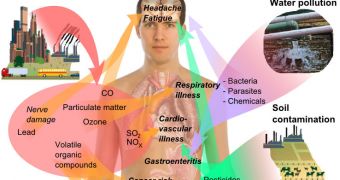The results of a new scientific investigation carried out on unsuspecting lab mice reveal a little-studied mechanism through which air pollution influences the brain physically. In the long-run, exposure to a lot of pollution can lead to memory problems, and even depression.
This research is added to the massive body of evidence showing the negative effects of pollution. Past studies have demonstrated that chemicals released in the air by automobiles, factories and power plant can have a negative impact on the heart and the lungs.
Experts say that this is one of the first long-term studies ever to assess the impact of particles making up air pollutants on the human brain. The investigation was led by Ohio State University (OSU) PhD student Laura Fonken, also the lead author of the new study.
She explains that prolonged exposure to contaminated air can lead to changes in the brain that in turn put people at increased risk of developing a wide array of health problems. The conclusions of the study concern those who live and work in polluted urban areas directly.
Details of the research appear in a paper published in this week's online issue of the esteemed medical journal Molecular Psychiatry. Experts from the OSU Davis Heart and Lung Research Institute were also involved in the new investigation.
“The more we learn about the health effects of prolonged exposure to air pollution, the more reasons there are to be concerned. This study adds more evidence of pollution's negative effects on health,” explains Randy Nelson.
The expert, a coauthor of the research paper, holds an appointment as a professor of neuroscience and psychology at OSU. He explains that mice in the new experiments were subjected to either filtered or polluted air for prolonged periods of time.
The rodents in the test group endured air pollutants for six hours a day, five days a week for 10 months. That is nearly half of the average lifespan for mice. The researchers used this approach to stimulate long-term exposure in humans.
The team noticed that the most significant changes the brain suffered occurred in the hippocampus, a region known to be involved in memory formation, as well as other higher cognitive functions.
“We wanted to look carefully at the hippocampus because it is associated with learning, memory and depression,” Fonken explains. He is also a member of the OSU Institute for Behavioral Medicine Research.
“The hippocampus is particularly sensitive to damage caused by inflammation. We suspect that the systemic inflammation caused by breathing polluted air is being communicated to the central nervous system,” the expert concludes, quoted by EurekAlert.

 14 DAY TRIAL //
14 DAY TRIAL //